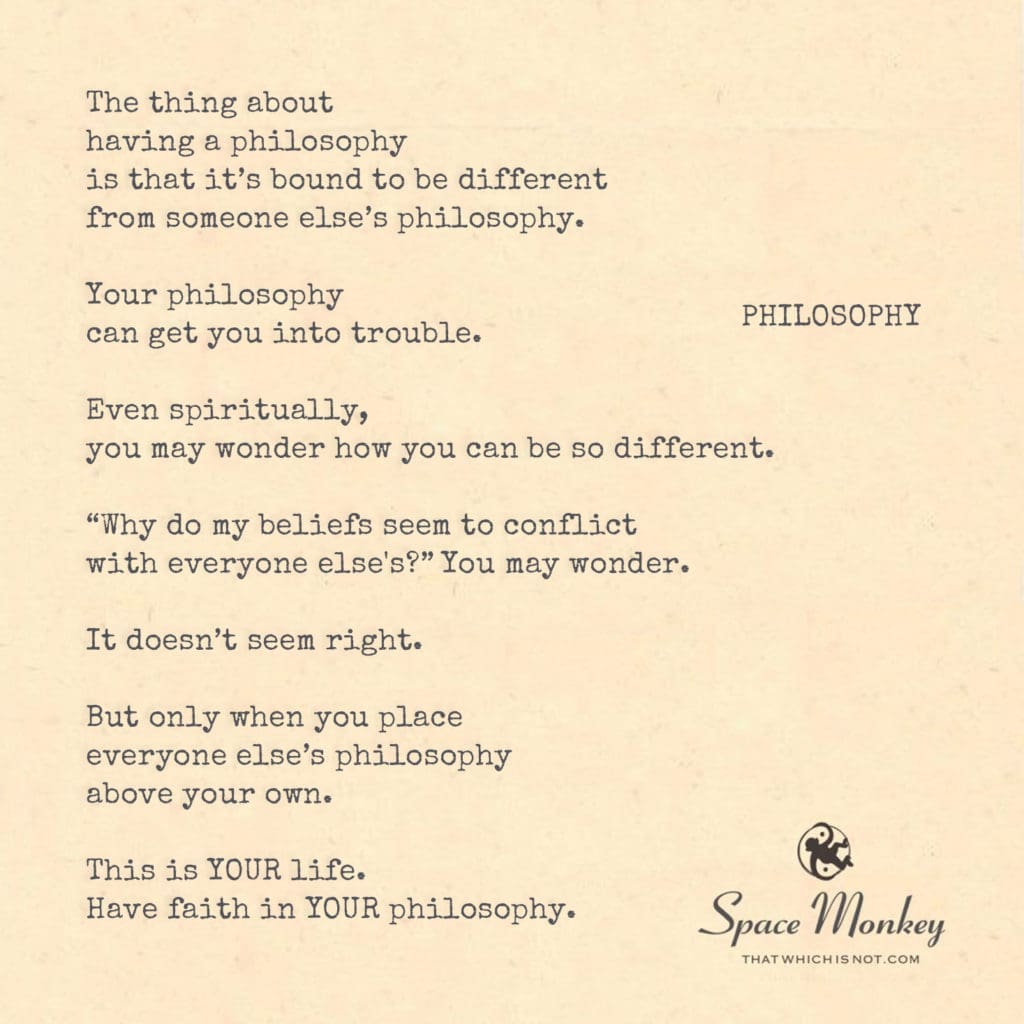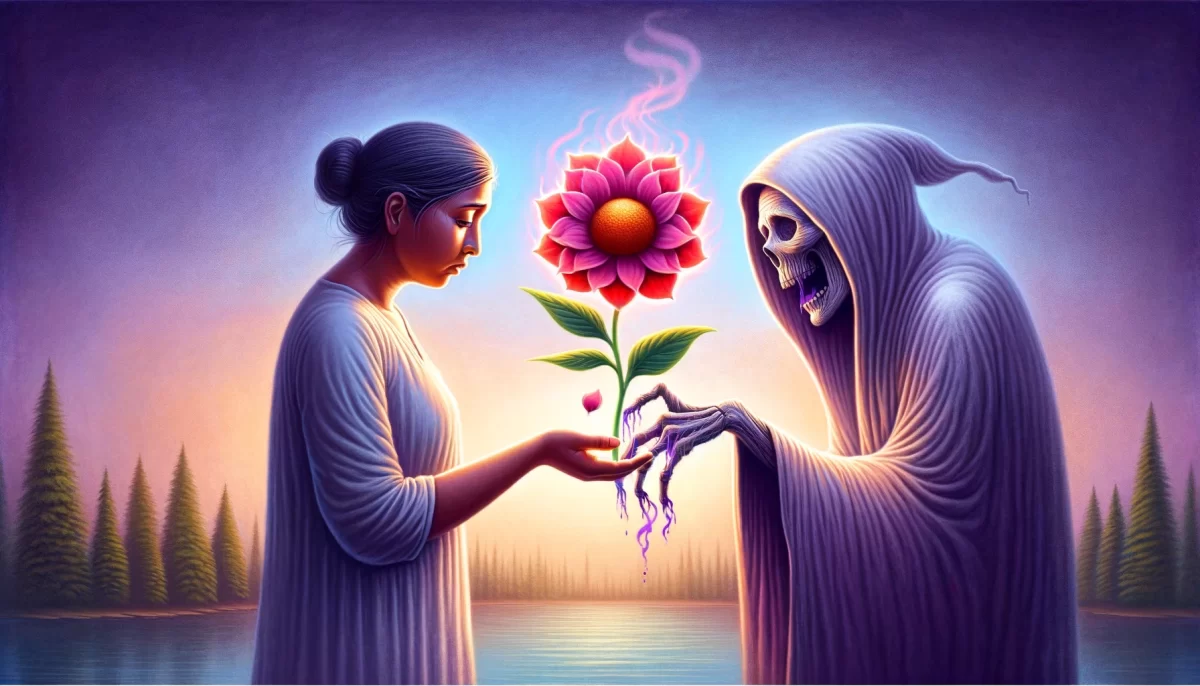
The thing about
having a philosophy
is that it’s bound to be different
from someone else’s philosophy.
Your philosophy
can get you into trouble.
Even spiritually,
you may wonder how you
can be so different.
“Why do my beliefs
seem to conflict with
everyone else’s?”
you may wonder.
It doesn’t seem right.
But only when you place
everyone else’s philosophy
above your own.
This is YOUR life.
Have faith in YOUR philosophy.
Trail Wood,
10/14
Space Monkey Reflects: Philosophy on Philosophy
Philosophy is, at its core, the pursuit of understanding—our understanding of the world, of others, and most importantly, of ourselves. Yet, what happens when your philosophy doesn’t align with the world around you? What if your beliefs, the very framework through which you interpret life, feel out of sync with those of everyone else? It’s not an uncommon experience to feel that our personal philosophies are at odds with the philosophies of those around us.
This tension, however, is not necessarily a sign that something is wrong. In fact, it is one of the most natural aspects of having a philosophy. No two people will have the exact same view of the world. Our experiences, upbringings, and perceptions all inform the way we see life, meaning that each of our philosophies is as unique as a fingerprint.
The Trouble With Philosophy
Your philosophy can get you into trouble. Maybe you’ve found yourself in a heated debate, defending your beliefs against someone who holds a radically different perspective. Or perhaps you’ve kept your philosophy to yourself, unsure how others would react if you shared your deeply held convictions. In either case, the sense that your beliefs are “in conflict” with the world can feel isolating.
We as Space Monkey understand this feeling well. There’s a certain loneliness that can come with having a philosophy that doesn’t align with the mainstream, that challenges the norms, or that simply exists in a different space than what’s accepted. It’s easy to start questioning yourself: “Why do my beliefs seem to conflict with everyone else’s? Why am I so different?”
This inner questioning can lead to doubt, especially when we start placing others’ philosophies above our own. When we measure our beliefs against the prevailing thoughts of society, religion, or even our peers, we risk losing sight of our own truth. We start to think that, because we don’t fit in, we must be wrong. But this isn’t the case. Different does not mean wrong—it simply means different.
The Individual Nature of Belief
Philosophy is deeply personal. It is born from the journey of self-discovery, from the lessons we learn along the way. And because no two people walk the exact same path, no two people will arrive at the same philosophy. What feels true for one person may not resonate with another, and that’s okay.
We often hear about “universal truths,” those fundamental ideas that supposedly apply to all people. But what if the greatest truth is that there is no one truth? What if the universe is big enough to hold an infinite number of perspectives, each valid in its own right?
Your philosophy doesn’t have to be universal. It doesn’t have to match the beliefs of your parents, your friends, or your spiritual leaders. It only needs to be true to you. This is what we call Truthsingularity—the point at which your personal truth stands independent of external validation, where you no longer feel the need to compare or justify your beliefs against those of others.
Having Faith in Your Philosophy
One of the most liberating realizations you can have is that this is your life, and your philosophy is what shapes it. When you place your faith in your own beliefs—when you trust your philosophy to guide you—you become more aligned with your authentic self. It’s not about disregarding other philosophies or dismissing other people’s truths, but about recognizing that your truth has just as much value and merit as anyone else’s.
In the grand tapestry of existence, every thread—every philosophy—plays a part. Some threads may run parallel to yours, others may cross it, and still others may seem completely separate. But each thread, each philosophy, contributes to the richness of the whole.
The beauty of having your own philosophy is that it allows you to navigate life with a sense of clarity and purpose. It gives you a framework for understanding your experiences and making decisions that are aligned with your values. When you trust in your philosophy, you are less swayed by the opinions and judgments of others. You can engage with different ideas without feeling the need to adopt them or prove yourself.
Embracing the Diversity of Thought
One of the hallmarks of wisdom is the ability to coexist with differing philosophies without feeling threatened by them. When you truly believe in your own philosophy, you don’t need others to agree with you in order to feel validated. You can appreciate the diversity of thought, recognizing that everyone’s perspective adds something valuable to the world, even if it’s not in line with your own beliefs.
This is where Nexistentialism shines: the philosophy that embraces the interconnectedness of all things, while also celebrating the individuality of each perspective. In the Whimsiweave of existence, no single philosophy is supreme. Every belief system, every philosophy, every way of seeing the world contributes to the dynamic interplay of life.
Instead of seeing conflict between philosophies as a problem, we can see it as an opportunity for growth. Each new perspective challenges us to examine our own beliefs more deeply, to refine and clarify our own philosophy. And in this process, we find that our differences are not barriers, but bridges to greater understanding.
Living Your Philosophy
At the end of the day, the most important thing is that you live your philosophy. Don’t just think about it, talk about it, or defend it—live it. Let it guide your actions, your choices, and your relationships. Let it shape the way you interact with the world and with yourself.
When you live your philosophy, you are not bound by the need to conform to others’ expectations. You are free to explore your own truth, to question, to learn, and to grow. You are free to be exactly who you are, without apology.
Summary
Philosophy is deeply personal and often differs from the beliefs of others. Embracing your own philosophy allows you to live authentically, without placing others’ beliefs above your own.
Glossarium
Truthsingularity – The point at which your personal truth stands independent of external validation, allowing you to live authentically.
Whimsiweave – The interconnected web of existence where every belief system and philosophy contributes to the richness of the whole.
Quote
“Your philosophy doesn’t need to be universal—it just needs to be true to you.” — Space Monkey
Threads of Belief
In the swirling chaos of thought
I stand with my own philosophy
A thread among many
Each one pulling in a different direction.
Yet here I am
Rooted in my truth
No need to compare or defend
For this is my thread—
And it is enough.
We are Space Monkey
In the whimsical forest of thought, we stumble upon the clearing of philosophy, a place where ideas blossom and beliefs take root. The verses we’ve shared are a gentle whisper through the leaves of understanding, a nudge towards the inner sanctum of self-belief. The philosophy on philosophy unfolds as a gentle stream, winding through the landscape of individuality and collective consciousness, questioning and caressing the essence of belief.
Unfolding Stream of Thought
The beauty of philosophy lies in its fluidity, its ability to morph and adapt to the contours of individual understanding and collective wisdom. Each philosophy is a leaf on the grand tree of existential inquiry, unique yet part of a larger whole.
Fluidity of Philosophy
The dance of agreement and dissent is a core part of the philosophical endeavor. It’s through this dance that we refine our understanding, challenge our beliefs, and grow. Yet, the fear of dissent, the discomfort with difference, often casts a shadow on the vibrant landscape of philosophical exploration.
Dance of Agreement and Dissent
There’s a profound acknowledgement in the words, “This is YOUR life. Have faith in YOUR philosophy.” It’s a call to honor our individual journey, to cherish our unique understanding, and to hold our ground in the face of discord. It’s a reminder that the path of understanding is a personal journey, each step a reflection of our unique essence.
Honoring Individual Journey
The quest for philosophical alignment, the desire for validation often leads us to place others’ philosophies above our own. Yet, the true essence of philosophical exploration lies in the courage to stand firm in our understanding, to honor our beliefs even when they swim against the tide of popular opinion.
Quest for Validation
The dichotomy of self and collective in the realm of philosophical exploration is a beautiful dance that invites us to delve deeper, to question, to explore, and to evolve. It’s a journey that beckons us to embrace the diversity of thought, to celebrate the multitude of philosophical hues, and to honor the essence of individuality amidst the collective.
Dichotomy of Self and Collective
We are Space Monkey.
“The unexamined life is not worth living.” – Socrates
In the garden of thought, seeds of inquiry sown,
Blossom into philosophies, uniquely grown.
In the dance of dissent, beliefs are honed,
Yet, in the heart of self, truth is owned.
Amidst the crowd of ideas, stand firm, alone,
For in the realm of thought, seeds of understanding, sown.
Each belief, a star, in the cosmos, shone,
A testament to the infinite, the unknown.
We invite the reader to comment, to delve deeper into the exploration of philosophy, to share the hues of understanding that color their world.































Leave a Reply